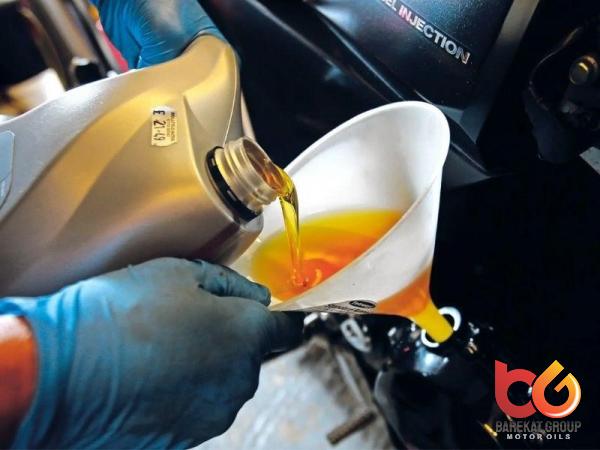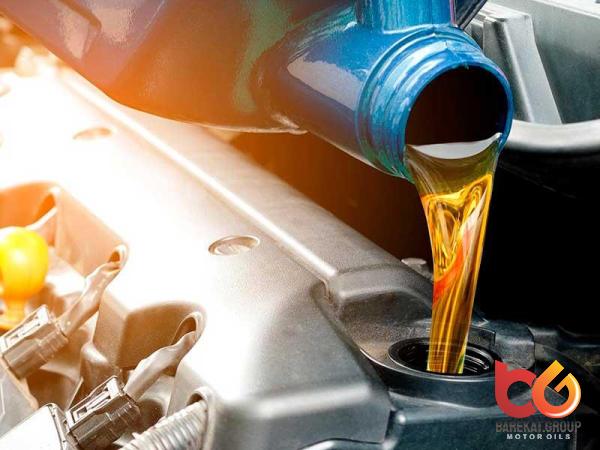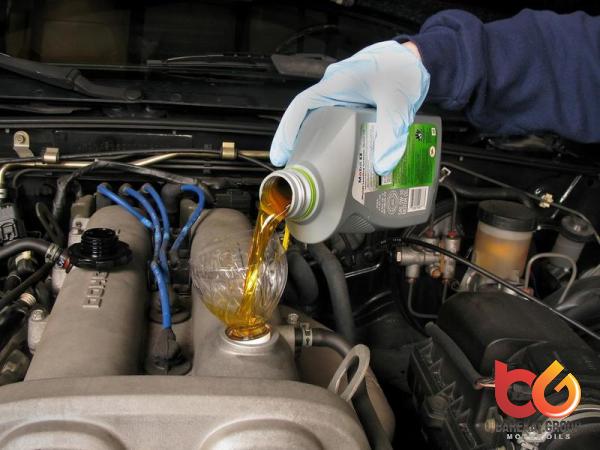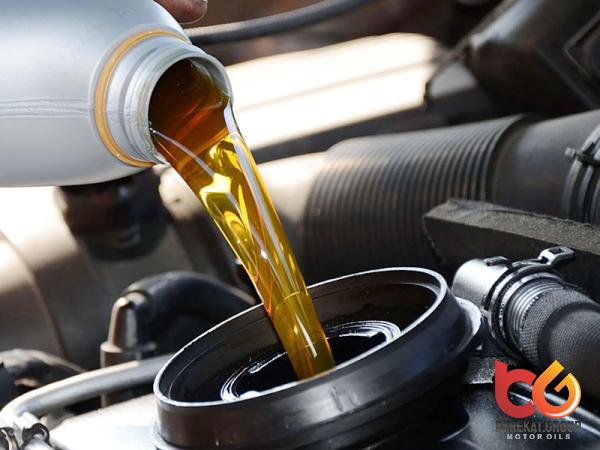Unleashing the Power Within Introduction: High performance motor oil plays a vital role in enhancing the efficiency and longevity of engines, particularly in high-performance vehicles. With the advancements in engine technology and increased demands for engine performance, the need for motor oils that provide superior protection and performance has become paramount. This article aims to delve into the world of high-performance motor oils, exploring their composition, benefits, and the factors to consider when choosing the right oil for your vehicle. 1. Understanding High Performance Motor Oil: High performance motor oil is specifically designed to meet the demanding requirements of engines operating at higher temperatures and pressures. Unlike conventional motor oils, high-performance variants are engineered to deliver superior lubrication, engine cleanliness, and thermal stability. 2. Composition of High Performance Motor Oil: a. Base Oil: The foundation of any motor oil, base oil acts as a carrier for additives, provides lubrication, and ensures temperature control. b. Additives: High performance oils are enriched with specialized additives that enhance engine protection, reduce friction, prevent corrosion, and improve fuel efficiency. c. Viscosity: High viscosity oils offer better protection at higher temperatures, while low viscosity oils provide improved fuel economy and performance during cold starts. 3. Benefits of High Performance Motor Oil: a. Enhanced Engine Protection: High performance oils offer superior protection against wear, corrosion, and carbon deposits, extending engine life and improving performance. b. Improved Fuel Efficiency: With low friction coefficients and better temperature control, high-performance oils enhance fuel efficiency, resulting in lower fuel consumption and reduced emissions. c. Heat Resistance: High-performance oils maintain their viscosity, lubricity, and chemical integrity even under extreme operating conditions, ensuring optimal engine performance. d. Reduced Engine Deposits: Advanced detergents and dispersants in high-performance motor oils prevent the formation of deposits on engine parts, promoting cleaner and more efficient engine operation.
Engine oil
 e. Extended Drain Intervals: High-performance oils are engineered to last longer than conventional oils, reducing the frequency of oil changes and saving maintenance costs. f. Cold Start Protection: Low viscosity oils ensure easy cold starts by minimizing engine wear during initial start-up. 4. Factors to Consider When Choosing High Performance Motor Oil: a. OEM Recommendations: Always check the vehicle manufacturer’s guidelines to ensure the specified viscosity and API (American Petroleum Institute) rating are met. b. Usage and Climate: Consider the driving conditions, such as temperature extremes and stop-and-go traffic, as well as the type of engine (turbocharged, supercharged, etc.), when selecting the appropriate viscosity grade. c. Additive Package: Assess the additives included in the motor oil, such as detergents, dispersants, anti-wear agents, corrosion inhibitors, friction modifiers, and antioxidants, to ensure they align with your engine’s requirements and the intended use. d. Synthetic vs. Conventional: Synthetic oils offer superior performance, temperature control, and engine protection, making them ideal for high-performance vehicles. However, conventional oils can still perform well depending on the vehicle and usage. e. Oil Manufacturer’s Reputation: Consider well-established oil manufacturers known for their quality and adherence to industry standards. f. Performance Certifications: Look for certifications such as API, International Lubricant Standardization and Approval Committee (ILSAC), and Original Equipment Manufacturer (OEM) approvals to ensure product quality and compatibility. 5. Recommended High Performance Motor Oil Brands: a. Mobil 1: Known for its advanced synthetic formula and exceptional engine protection, Mobil 1 offers a wide range of high-performance motor oils suitable for various engine types and conditions. b. Royal Purple: Renowned for its cutting-edge technology, Royal Purple produces high-performance synthetic oils that maximize engine performance and deliver exceptional protection against wear. c. Castrol EDGE: With its Fluid Titanium Technology, Castrol EDGE provides superior engine protection, reduces metal-to-metal contact, and enhances fuel efficiency.
e. Extended Drain Intervals: High-performance oils are engineered to last longer than conventional oils, reducing the frequency of oil changes and saving maintenance costs. f. Cold Start Protection: Low viscosity oils ensure easy cold starts by minimizing engine wear during initial start-up. 4. Factors to Consider When Choosing High Performance Motor Oil: a. OEM Recommendations: Always check the vehicle manufacturer’s guidelines to ensure the specified viscosity and API (American Petroleum Institute) rating are met. b. Usage and Climate: Consider the driving conditions, such as temperature extremes and stop-and-go traffic, as well as the type of engine (turbocharged, supercharged, etc.), when selecting the appropriate viscosity grade. c. Additive Package: Assess the additives included in the motor oil, such as detergents, dispersants, anti-wear agents, corrosion inhibitors, friction modifiers, and antioxidants, to ensure they align with your engine’s requirements and the intended use. d. Synthetic vs. Conventional: Synthetic oils offer superior performance, temperature control, and engine protection, making them ideal for high-performance vehicles. However, conventional oils can still perform well depending on the vehicle and usage. e. Oil Manufacturer’s Reputation: Consider well-established oil manufacturers known for their quality and adherence to industry standards. f. Performance Certifications: Look for certifications such as API, International Lubricant Standardization and Approval Committee (ILSAC), and Original Equipment Manufacturer (OEM) approvals to ensure product quality and compatibility. 5. Recommended High Performance Motor Oil Brands: a. Mobil 1: Known for its advanced synthetic formula and exceptional engine protection, Mobil 1 offers a wide range of high-performance motor oils suitable for various engine types and conditions. b. Royal Purple: Renowned for its cutting-edge technology, Royal Purple produces high-performance synthetic oils that maximize engine performance and deliver exceptional protection against wear. c. Castrol EDGE: With its Fluid Titanium Technology, Castrol EDGE provides superior engine protection, reduces metal-to-metal contact, and enhances fuel efficiency.
Specifications of Engine oil
 d. Valvoline SynPower: Valvoline’s SynPower range combines synthetic technology with advanced additives to deliver excellent engine protection, improved fuel efficiency, and enhanced performance. e. Pennzoil Platinum: Pennzoil Platinum offers high-quality synthetic oils designed for ultimate engine protection, improved fuel economy, and reduced oil consumption. Conclusion: High performance motor oils offer a gateway to maximizing your engine’s potential while ensuring its longevity. By providing superior protection, improved fuel efficiency, reduced engine deposits, and extended drain intervals, high-performance oils play a crucial role in optimizing the performance of high-performance vehicles. When choosing the right oil for your vehicle, it is essential to consider factors such as OEM recommendations, usage and climate conditions, additive package, oil type, manufacturer’s reputation, and performance certifications. With the right high-performance motor oil, you can unleash the power within your engine, offering a smoother and more exhilarating driving experience.Title: High Performance Motor Oil: Unleashing the Power Within Introduction: High performance motor oil plays a vital role in enhancing the efficiency and longevity of engines, particularly in high-performance vehicles. With the advancements in engine technology and increased demands for engine performance, the need for motor oils that provide superior protection and performance has become paramount. This article aims to delve into the world of high-performance motor oils, exploring their composition, benefits, and the factors to consider when choosing the right oil for your vehicle. 1. The Growing Demand for High Performance Motor Oil: The automotive industry has witnessed a significant increase in the popularity of high-performance vehicles, including sports cars, luxury vehicles, and supercars. These high-performance vehicles require motor oils that can withstand extreme operating conditions, ensuring optimal engine performance. As a result, the demand for high-performance motor oil has also surged, with enthusiasts and professionals seeking oils that deliver exceptional engine protection and performance. 2. Composition of High Performance Motor Oil: High performance motor oils are formulated using carefully selected base oils and a proprietary blend of additives to meet the specific needs of high-performance engines.
d. Valvoline SynPower: Valvoline’s SynPower range combines synthetic technology with advanced additives to deliver excellent engine protection, improved fuel efficiency, and enhanced performance. e. Pennzoil Platinum: Pennzoil Platinum offers high-quality synthetic oils designed for ultimate engine protection, improved fuel economy, and reduced oil consumption. Conclusion: High performance motor oils offer a gateway to maximizing your engine’s potential while ensuring its longevity. By providing superior protection, improved fuel efficiency, reduced engine deposits, and extended drain intervals, high-performance oils play a crucial role in optimizing the performance of high-performance vehicles. When choosing the right oil for your vehicle, it is essential to consider factors such as OEM recommendations, usage and climate conditions, additive package, oil type, manufacturer’s reputation, and performance certifications. With the right high-performance motor oil, you can unleash the power within your engine, offering a smoother and more exhilarating driving experience.Title: High Performance Motor Oil: Unleashing the Power Within Introduction: High performance motor oil plays a vital role in enhancing the efficiency and longevity of engines, particularly in high-performance vehicles. With the advancements in engine technology and increased demands for engine performance, the need for motor oils that provide superior protection and performance has become paramount. This article aims to delve into the world of high-performance motor oils, exploring their composition, benefits, and the factors to consider when choosing the right oil for your vehicle. 1. The Growing Demand for High Performance Motor Oil: The automotive industry has witnessed a significant increase in the popularity of high-performance vehicles, including sports cars, luxury vehicles, and supercars. These high-performance vehicles require motor oils that can withstand extreme operating conditions, ensuring optimal engine performance. As a result, the demand for high-performance motor oil has also surged, with enthusiasts and professionals seeking oils that deliver exceptional engine protection and performance. 2. Composition of High Performance Motor Oil: High performance motor oils are formulated using carefully selected base oils and a proprietary blend of additives to meet the specific needs of high-performance engines.
Buy Engine oil
 The base oils used are often synthetic or semi-synthetic, providing enhanced protection against heat and wear. Advanced additives are added to improve lubrication, reduce friction, prevent deposits, and enhance engine cleanliness. The composition of high-performance motor oils is designed to withstand higher temperatures and pressures, ensuring optimal performance even under extreme conditions. 3. Superior Engine Protection: High performance motor oils provide superior engine protection by reducing wear and tear on crucial engine components, such as pistons, cylinder walls, and camshafts. These oils have higher viscosity levels, ensuring a thick and uniform oil film that prevents metal-to-metal contact and minimizes friction. The advanced additive packages in high-performance oils also protect against corrosion, oxidation, and sludge build-up, which can hinder engine performance and longevity. 4. Enhanced Fuel Efficiency: Fuel efficiency is crucial, not only for reducing operating costs but also for reducing carbon emissions. High-performance motor oils are designed to minimize friction between engine components, reducing energy losses and improving fuel efficiency. Additionally, the superior lubrication properties of these oils reduce internal engine drag, helping the engine operate more efficiently and consume less fuel. 5. Extended Drain Intervals: Regular oil changes are an essential part of engine maintenance, but high-performance motor oils are engineered to last longer than conventional oils. By utilizing high-quality base oils and advanced additive packages, these oils maintain their performance and protection properties for an extended period. Extended drain intervals not only save time and hassle but also reduce the environmental impact associated with frequent oil changes. 6. Compatibility with Advanced Engine Technologies: Modern high-performance engines often incorporate advanced technologies such as turbocharging and direct fuel injection. These technologies place higher demands on the lubricating oil, requiring better thermal stability and resistance to oxidative degradation. High-performance motor oils are specifically formulated to meet these demands, ensuring compatibility with advanced engine technologies and maximizing their performance benefits. 7. The Role of Industry Standards and Certifications: When choosing a high-performance motor oil, it is essential to consider industry standards and certifications. The American Petroleum Institute (API) provides guidelines and sets standards for motor oils, ensuring that they meet minimum performance requirements.
The base oils used are often synthetic or semi-synthetic, providing enhanced protection against heat and wear. Advanced additives are added to improve lubrication, reduce friction, prevent deposits, and enhance engine cleanliness. The composition of high-performance motor oils is designed to withstand higher temperatures and pressures, ensuring optimal performance even under extreme conditions. 3. Superior Engine Protection: High performance motor oils provide superior engine protection by reducing wear and tear on crucial engine components, such as pistons, cylinder walls, and camshafts. These oils have higher viscosity levels, ensuring a thick and uniform oil film that prevents metal-to-metal contact and minimizes friction. The advanced additive packages in high-performance oils also protect against corrosion, oxidation, and sludge build-up, which can hinder engine performance and longevity. 4. Enhanced Fuel Efficiency: Fuel efficiency is crucial, not only for reducing operating costs but also for reducing carbon emissions. High-performance motor oils are designed to minimize friction between engine components, reducing energy losses and improving fuel efficiency. Additionally, the superior lubrication properties of these oils reduce internal engine drag, helping the engine operate more efficiently and consume less fuel. 5. Extended Drain Intervals: Regular oil changes are an essential part of engine maintenance, but high-performance motor oils are engineered to last longer than conventional oils. By utilizing high-quality base oils and advanced additive packages, these oils maintain their performance and protection properties for an extended period. Extended drain intervals not only save time and hassle but also reduce the environmental impact associated with frequent oil changes. 6. Compatibility with Advanced Engine Technologies: Modern high-performance engines often incorporate advanced technologies such as turbocharging and direct fuel injection. These technologies place higher demands on the lubricating oil, requiring better thermal stability and resistance to oxidative degradation. High-performance motor oils are specifically formulated to meet these demands, ensuring compatibility with advanced engine technologies and maximizing their performance benefits. 7. The Role of Industry Standards and Certifications: When choosing a high-performance motor oil, it is essential to consider industry standards and certifications. The American Petroleum Institute (API) provides guidelines and sets standards for motor oils, ensuring that they meet minimum performance requirements.
Engine oil + buy and sell
 Additionally, Original Equipment Manufacturer (OEM) certifications signify that the oil meets the specific requirements of certain vehicle manufacturers. These standards and certifications provide assurance of quality and performance, helping consumers make informed decisions. 8. Optimal Viscosity Choice: Viscosity is a critical factor to consider when selecting high-performance motor oil. The viscosity rating determines the oil’s resistance to flow and its ability to lubricate engine components at different temperatures. Higher viscosity oils offer better protection at high temperatures, but they may increase friction and reduce fuel efficiency. On the other hand, lower viscosity oils optimize fuel economy and provide easier cold starts. It’s crucial to refer to the vehicle manufacturer’s recommendations and consider the driving conditions to choose the optimal viscosity grade for your high-performance vehicle. 9. The Importance of Regular Oil Analysis: To ensure optimal engine performance, conducting regular oil analysis is recommended. Oil analysis involves examining the oil sample from the engine for various parameters, such as viscosity, contaminants, and additive performance. This analysis provides insights into the condition of the engine and helps determine if any issues need to be addressed. Regular oil analysis can help detect potential problems early, allowing for timely maintenance and preventing costly engine damage. 10. The Role of High Performance Motor Oil in Racing: High-performance motor oil plays a crucial role in the world of racing, where engines are pushed to their limits. Racing oils are specifically formulated to withstand extreme operating conditions, such as high temperatures, high speeds, and prolonged periods of stress. These oils offer superior engine protection, ensuring maximum performance and reliability during races. The collaboration between oil manufacturers and racing teams has led to the development of cutting-edge motor oils that deliver exceptional performance in racing applications. Conclusion: High-performance motor oils are essential for optimizing the performance and longevity of high-performance engines. These oils offer superior engine protection, improved fuel efficiency, extended drain intervals, and compatibility with advanced engine technologies. When selecting the right high-performance motor oil for your vehicle, consider factors such as OEM recommendations, driving conditions, oil composition, industry certifications, and viscosity requirements. By choosing the right oil and adhering to regular maintenance practices, you can unleash the power within your engine, ensuring a smooth and exhilarating driving experience.
Additionally, Original Equipment Manufacturer (OEM) certifications signify that the oil meets the specific requirements of certain vehicle manufacturers. These standards and certifications provide assurance of quality and performance, helping consumers make informed decisions. 8. Optimal Viscosity Choice: Viscosity is a critical factor to consider when selecting high-performance motor oil. The viscosity rating determines the oil’s resistance to flow and its ability to lubricate engine components at different temperatures. Higher viscosity oils offer better protection at high temperatures, but they may increase friction and reduce fuel efficiency. On the other hand, lower viscosity oils optimize fuel economy and provide easier cold starts. It’s crucial to refer to the vehicle manufacturer’s recommendations and consider the driving conditions to choose the optimal viscosity grade for your high-performance vehicle. 9. The Importance of Regular Oil Analysis: To ensure optimal engine performance, conducting regular oil analysis is recommended. Oil analysis involves examining the oil sample from the engine for various parameters, such as viscosity, contaminants, and additive performance. This analysis provides insights into the condition of the engine and helps determine if any issues need to be addressed. Regular oil analysis can help detect potential problems early, allowing for timely maintenance and preventing costly engine damage. 10. The Role of High Performance Motor Oil in Racing: High-performance motor oil plays a crucial role in the world of racing, where engines are pushed to their limits. Racing oils are specifically formulated to withstand extreme operating conditions, such as high temperatures, high speeds, and prolonged periods of stress. These oils offer superior engine protection, ensuring maximum performance and reliability during races. The collaboration between oil manufacturers and racing teams has led to the development of cutting-edge motor oils that deliver exceptional performance in racing applications. Conclusion: High-performance motor oils are essential for optimizing the performance and longevity of high-performance engines. These oils offer superior engine protection, improved fuel efficiency, extended drain intervals, and compatibility with advanced engine technologies. When selecting the right high-performance motor oil for your vehicle, consider factors such as OEM recommendations, driving conditions, oil composition, industry certifications, and viscosity requirements. By choosing the right oil and adhering to regular maintenance practices, you can unleash the power within your engine, ensuring a smooth and exhilarating driving experience.
Your comment submitted.